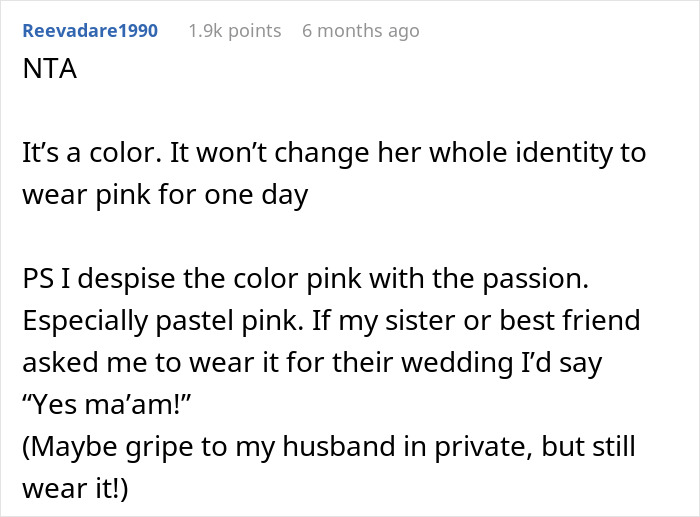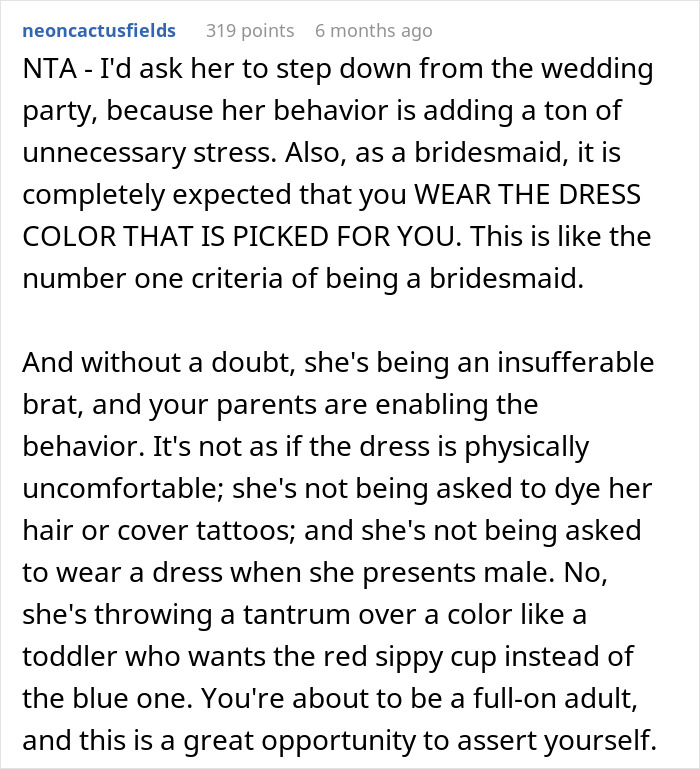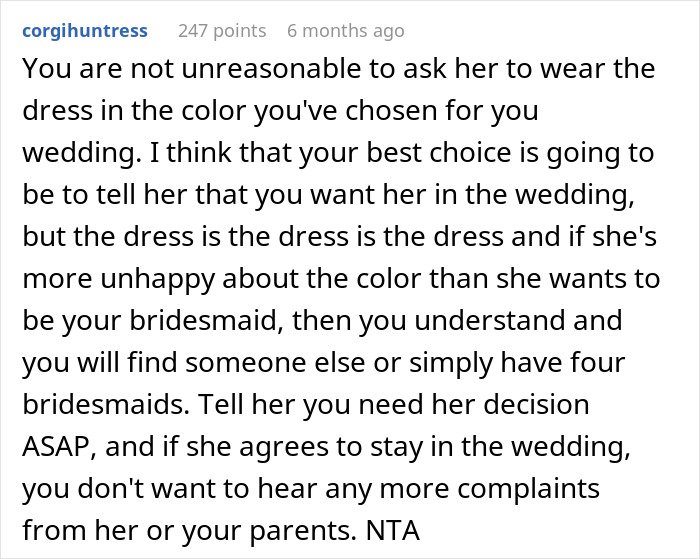It’s safe to assume that most people expect to get married once, which is why they want the day to be perfect.
For this bride-to-be, a perfect wedding entailed all of her bridesmaids wearing matching dresses, so she picked them out and paid for them herself. But one of the women—her sister—refused to wear it, saying that the pink color was “too girly” for her. That led to a rift between the siblings, and left the bride wondering if she would be a jerk if she told her sister to suck it up.
Seeking to better understand both of the sides involved, Bored Panda turned to a professor at the Rady Faculty of Health Sciences at the University of Manitoba, Dr. Michelle Lobchuk, who was kind enough to share her insight on the situation and discuss the role empathy plays in it.
Every bride wants their wedding day to be special

Image credits: iam luisao / pexels (not the actual photo)
This bride-to-be wanted her bridesmaids to wear matching pink dresses, but her sister was not up for it




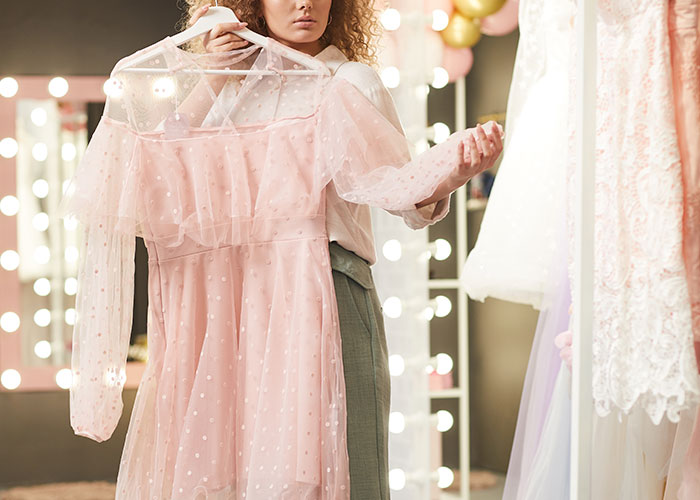
Image credits: seventyfourimages / envatoelements (not the actual photo)

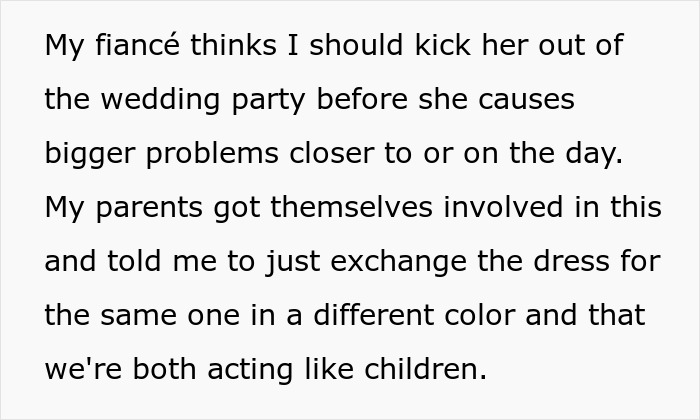

Image credits: ReadingChemical6240
Planning a wedding can be exciting yet stressful

Image credits: Karolina Grabowska / pexels (not the actual photo)
Planning a wedding is in no way an easy task. Don’t get this wrong; it can be fun and enjoyable, but juggling a hundred things at once—like choosing the venue, the caterers, and picking out outfits, just to name a few—can really test the strength of one’s patience. Not to mention the anticipation of the big day (even if very exciting), which takes its toll, too. With such a mix of emotions bubbling up, certain misunderstandings or arguments are close to inevitable.
“Let’s face it, wedding days are emotionally charged at multiple levels. It is best to acknowledge this and to accept that we’ll celebrate with felt emotion at different levels, for different reasons, and with different people,” Dr. Michelle Lobchuk told Bored Panda in a recent interview.
Even if people from all walks of life are invited, the happy couple is likely to have a different bond with each of them, leading to different emotions or expectations. That’s why they might not care that much about someone’s opinion on a certain matter, but take another person’s comments to heart immediately.
“As individuals, the bride and the sister each need to reflect on ‘why’ one feels as they do; in this case, [in regards to] the color of the bridesmaid dresses. This makes us better at communicating ‘who’ we are and what our needs are, which can foster better understanding,” Dr. Lobchuk explained by adding that both sisters should try to take the time to better understand each other’s perspectives. “Making the effort to try to ‘hear’ each other fosters respect and can open the door to negotiation that can help to ensure that everyone’s needs are met.”
It takes empathy to understand another person’s perspective

Image credits: Karolina Grabowska / pexels (not the actual photo)
Prof. Lobchuk emphasized that across many cultures, wedding days are significant life events, which is why the soon-to-be-married couple tends to have a certain vision of how they want it to look. Such a vision can help make sure that everything is altered according to their desires, but it can also become a reason for disputes, if others don’t support the idea they have in their heads.
“When seeing it from the bride’s perspective, one can understand her being upset with what appears to be an insincere, even selfish, attitude of her sister who does not want to support her sister’s vision,” the professor pointed out. “We have all heard stories about brides who become upset when their long-planned dreams for this special day are met with discordance by others.”
However, she added that when it comes to the wedding day—a reflection of unity and commitment—empathy plays quite an important role among all the involved parties. “Although practicing empathy is not easy in emotionally charged situations like weddings, the significance of this day speaks to the importance in paying caring attention to attitudes or behaviors that detract from the ‘unity’ message.”
Even though it’s not difficult to sympathize with the bride and see why she got upset, it’s important to remember that her sister might have her reasons too for acting the way that she did. “Empathy can help the bride and her sister understand each other’s perspectives and get them back on track to focus on practicing the ‘unity’ message of the wedding day,” Michelle Lobchuk suggested. “Everyone has a part to play in working toward enacting this message, not only the bride and groom but the bride’s sister as well.”
People in the comments hoped that the OP would provide more information regarding certain details

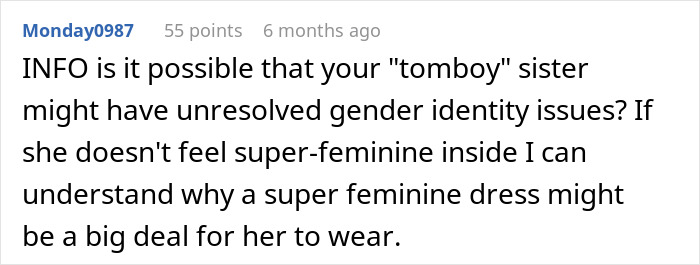
Many people didn’t think the OP was a jerk in the situation


